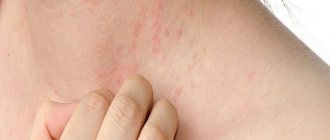Symptoms
Extracts of essential oils from plants are widely used in cosmetology - for body, face, and hair care. Therefore, allergies in most cases have the following manifestations:
- Itching on the surface of the skin.
- Rashes at the site of contact with the substance.
- Manifestations of allergic rhinitis.
- Allergic cough.
- Swelling of the mucous membranes of the mouth, eyes and throat.
- Inflammatory phenomena in the eyes - conjunctivitis.
Disturbances in the functioning of the respiratory system and lacrimation are observed when inhaling essential oil vapors. With severe manifestations, angioedema or giant urticaria may develop. This type of allergic manifestation requires immediate medical attention, as it develops at lightning speed, and can cause death if assistance is not provided in a timely manner.
Features of allergies to oil
A large number of natural and artificial oils are used in cooking and cosmetology, each of which has its own special composition. In the event of an allergic reaction, the body perceives the substance as a toxin, responding to it with increased production of specific antibodies.
Respiratory manifestations of allergies in adults
Acute intolerance to oil when consumed or externally leads to the synthesis of histamine, a substance that provokes all the unpleasant manifestations of allergies. As a result of increased histamine production, the body begins to actively fight the components of the product. The immune system's response includes respiratory symptoms, skin rashes, and other allergy symptoms.
Allergy to sunflower oil
Sunflower oil is considered one of the most common in cooking. The development of an allergy to sunflower oil in an infant is most often associated with hay fever or intolerance to sunflower seeds, which are the main raw material for the manufacture of this product.
The main signs of an allergic reaction to sunflower oil are identical to the clinical picture of food allergies.
- nasal congestion, runny nose, sneezing;
- inflammation of the eyes, tearing;
- choking, cough;
- skin rash combined with itching and burning.
Allergy to olive oil
Olive oil is considered one of the healthiest foods. It is used for preparing first and second courses, salads, as well as for cosmetic and medical purposes. Olive oil contains a huge amount of vitamins, micro- and macroelements, amino acids and other beneficial substances.
The development of an allergy to olive oil in a child most often develops if a woman consumed too much of this product during pregnancy or during breastfeeding. Hypersensitivity to olive can be caused by insufficient development of the digestive tract, early introduction of complementary foods, enzymatic deficiency or increased permeability of the stomach walls.
The symptoms of an allergy to olive oil are practically no different from the clinical picture of ordinary food hypersensitivity.
- Redness of the eyes, increased lacrimation.
- Runny nose, sneezing, nasal congestion.
- Choking, coughing.
- Redness, rashes on the skin, which are accompanied by itching and burning.
- Increased body temperature, chills.
- Stool upset, abdominal pain.
- Sudden changes in blood pressure.
Things to consider before using oil on your skin
- If you have sensitive skin, tea tree oil may cause skin irritation. In case you experience a burning sensation and if it hurts in the place where you applied it, wash it off immediately.
- In case you are taking any oral medications or using any ointment to treat your condition, consult a dermatologist before using tea tree oil. This is because you cannot use some medications along with the oil.
- Always dilute tea tree oil with a carrier oil or other ingredient. Do not use it directly on your face.
- Never swallow tea tree oil. It is intended for topical use and not for consumption.
Rosacea is very responsive to proper treatment. So, strictly follow the treatment suggested by your doctor. If you are using tea tree oil to manage rosacea, you will need to use it consistently. Otherwise you won't see results.
In addition to a good skin care regimen, you need to maintain a healthy lifestyle and good nutrition to prevent flare-ups. Managing rosacea requires a holistic approach. So, follow the treatment options listed in this article and those suggested by your doctor to treat flare-ups. Let us know how your skin feels after using the treatment options mentioned above. You can leave your review in the box below.
Is Tea Tree Oil Good for Rosacea?
Yes, because it helps control and eliminate demodex mites.
Demodex is a genus of mites that live in our skin. There are two species namely Demodex folliculorum (which lives in the hair follicles) and Demodex brevis (which lives in our sebaceous glands). Demodex folliculorum is usually found in large numbers on the skin of people suffering from rosacea.
Another study found that tea tree oil contains terpinen-4-ol, an ingredient that can kill demodex mites.
We recommend reading
How to get rid of acne on your face at home
A study evaluated the effectiveness of permethrin 2.5% along with tea tree oil gel on rosacea. Researchers found that the topical gel significantly reduced the number of demodex mites and inhibited inflammation caused by rosacea.
There haven't been many studies on the effectiveness of tea tree oil in combating rosacea (caused by any cause other than excess demodex activity). However, it has helped treat similar skin problems.
Wondering how you can use tea tree oil for rosacea? Here are some simple recipes you can try at home. Remember to do a patch test before using tea tree oil to check if you are allergic to it.
Rosacea is a chronic inflammatory condition, so consult a dermatologist before using tea tree oil or any other home remedies.










